PTLD Stories of Strength
View More Stories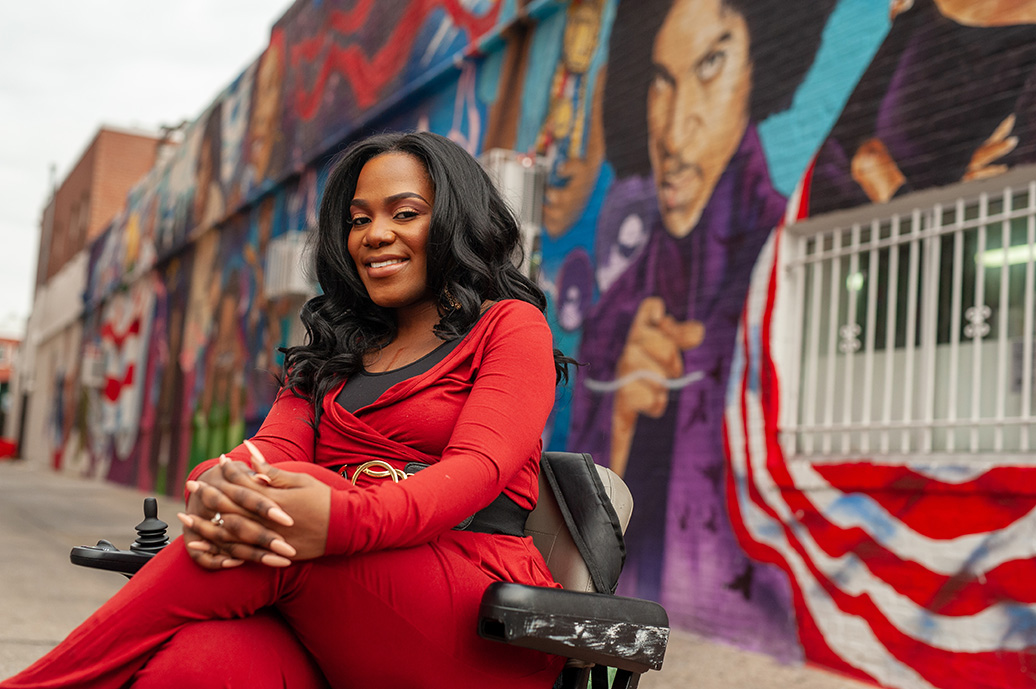
Ola, PTLD Advocate
Washington, DC
Living with mitochondrial disease
Heart and kidney transplant recipient
I am who I am because of my disability. People read my story and say, ‘You are a role model to me.’ Hearing that from others is what drives me forward.
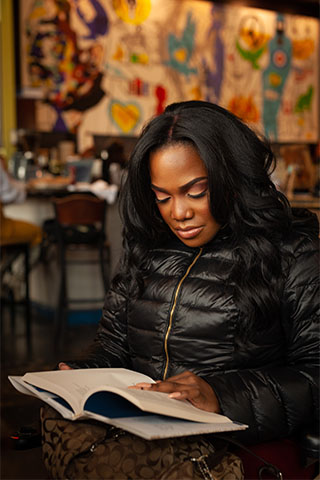 Ola zips her wheelchair with ease across the urban landscape of Washington, DC, pointing out buildings and businesses like a tour guide of the city in which she has lived her entire adult life. Circumventing a pothole in the sidewalk, she crosses a side street and confidently waves a car through before entering into the alley to gaze up at her favorite murals. Many of these murals boast images of Ola’s heroes––Black, influential figures that helped shape the course of American history toward greater freedom and rights for people of color.
Ola zips her wheelchair with ease across the urban landscape of Washington, DC, pointing out buildings and businesses like a tour guide of the city in which she has lived her entire adult life. Circumventing a pothole in the sidewalk, she crosses a side street and confidently waves a car through before entering into the alley to gaze up at her favorite murals. Many of these murals boast images of Ola’s heroes––Black, influential figures that helped shape the course of American history toward greater freedom and rights for people of color.
Ola’s passion for and career in social activism stems directly from her experience as a person who has lived with illness and disability her entire life. She has experienced first-hand society’s discrimination not only toward disabled people but, in her case, a disabled woman of color. “People with disabilities are the largest minority in this country,” she says. “It’s terrible how we get treated. People talk to me in a baby voice. Because I’m in a wheelchair, they think I am stupid. These experiences have shaped my career. I am working to end discrimination on all levels.” Professionally and as a volunteer, Ola advocates endlessly for everyone’s right to live with freedom, integrity, and access.
Early Struggles
Ola’s story of strength begins in toddlerhood. When she was just learning to walk and run, she was plagued with constant fatigue. She would often gasp for breath and complain of pain. Her mom, Nse, describes how common outings, like a trip to the zoo, were challenging. “We had to put Ola in a stroller, even though she was two years old, because she was so tired.” The family believed her lack of energy was due to her asthma, which had been diagnosed by her pediatrician. Ola says, “In elementary school, other kids would say, ‘Why are you so slow?’ Kids would be mad because I didn’t have to do PE. They thought I was getting special privileges, that I was lazy, or that I was pretending.”
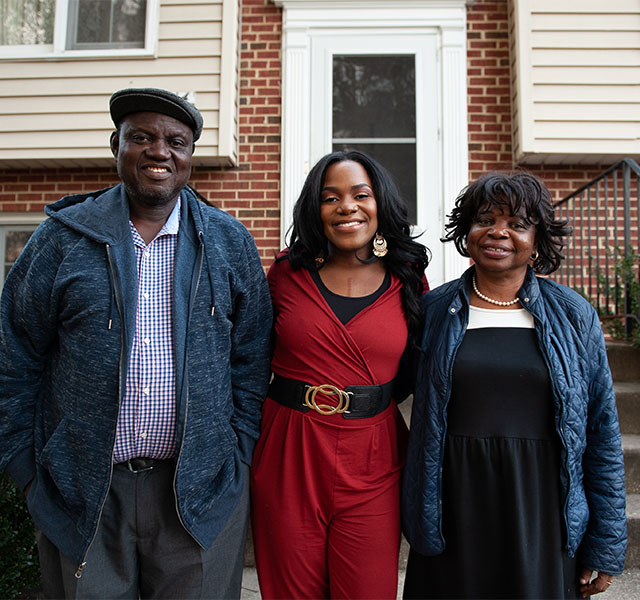
Ola’s parents took her in for regular annual checkups to the pediatrician, but nothing was diagnosed. Looking back, Ola reflects on the possible cultural barriers that prevented her parents from questioning the authority of the doctor. They had both immigrated from Nigeria and met at the University of the District of Columbia. “I grew up in a trilingual household,” Ola says, “Yoruba is my dad’s language, and my mom’s is Efik. I only learned English because that’s what Sesame Street taught me!” Her parents never imagined that a life-altering diagnosis was behind Ola’s exhaustion. They simply accepted the doctor’s expertise.
It wasn’t until 5th grade that a pediatric cardiologist diagnosed her with hypertrophic cardiomyopathy. Her heart had grown too large for her body and wasn’t able to pump efficiently. “I was nine at the time and it felt like my life was ruined. When you’re a kid you just want to be normal and like everybody else. Going to the doctor and hearing all these big words was scary.”
A little over a year later, Ola was also diagnosed with mitochondrial disease. “When it rains, it pours,” she explains, shaking her head with compassion for her younger self. With the combination of illnesses, Ola was beginning to experience organ failure in her heart and her kidneys. She was put on the list for a heart transplant. “I went to my room to cry. My mom cried. I never saw my dad cry, but my brother says he did.”
Ola longed for a normal childhood to the point that she willfully denied the seriousness of her disease. “I was hiding things from my parents so they wouldn’t bring me back to the doctor. For example, at night, I couldn’t lie flat. My heart was so big it put pressure on my lungs. I would sleep propped up on a chair and nobody noticed because my mom worked nights. When I heard her come in, I would get back into the bed.”
A New Lease on Life
A few months later, a call came. A heart was available for Ola. “I went to my brothers’ school to say goodbye, and we went via medical jet. We flew from Reagan to Pittsburgh. I was lying down on a medical bed the entire time. It was difficult to breathe, but I kept that to myself because I saw how the illness affected my family and my loved ones and I didn’t want to make them upset.” The EMTs transferred Ola from the jet to an ambulance flashing red lights across the tarmac. “Will I get out in time to see the B2K band on my birthday?” she joked. She was putting on a brave face for the benefit of her parents, but right before she went under, she cried to her mom, ‘I love you. I love you.’ “I believed I was gonna die,” she says.
Four days later, Ola woke up in the ICU, nurses surrounding her. “I remember waking up with tubes in my mouth and I was in so much pain.” Much to her parents’ relief, both transplants, performed five hours apart, had been successful.
The kidney was a surprise to Ola. When Ola told the nurses that her stomach hurt, they told her that it hurt because she had a new kidney. “I didn’t even know I had gotten a kidney transplant!” she says, her eyes wide with the memory. At the last minute, before she went under, they had been accepted for a kidney from the same donor because the doctors didn’t think Ola’s kidneys would be able to handle the lifelong medical treatment to sustain a heart transplant.
There’s nothing wrong with people who have disabilities. Everyone is going to be disabled and need help one day. I teach people there is nothing shameful about this.
Ola’s recovery was difficult. The kidney transplant caused damage to nerves in her right leg, which made walking incredibly challenging. She limped along, grasping a walker in order to make her way down the hallways of the hospital. On top of the pain of recovery, she saw cultural barriers and discrimination at work in the hospital. Her parents were talked down to because they were immigrants of color. “The biases in the hospital made it difficult to access painkillers. They kept giving me Tylenol instead of something stronger.”
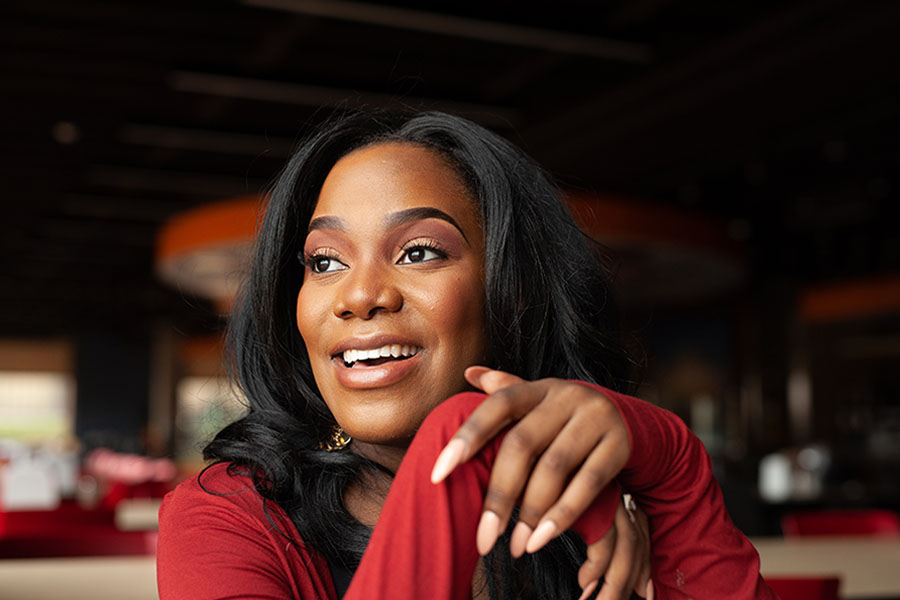
Ola returned home after four weeks, but she was still much weaker and more easily exhausted than her peers. She continued to face relentless mistreatment at school. Kids looked at her strangely, partly because her disability was invisible and they didn’t understand her exhaustion. Out of embarrassment and shame, she didn’t like to talk about her illnesses or her surgeries. In 6th grade, a PE teacher told her to run, and when Ola said she couldn’t, the teacher demanded it. Ola began to cry and overheard the teacher say, “What is wrong with her?” Years later as an adult, Ola would recall this memory as a source of inspiration for her activism. “There’s nothing wrong with people who have disabilities. Everyone is going to be disabled and need help one day. I teach people there is nothing shameful about this.”
At the age of 13, Ola was invited by the hospital for a special opportunity to see her old heart. “They brought me back to the hospital to hold my heart and to appreciate what I had been given. They took my heart out of the refrigerator. A heart is supposed to be the size of a fist balled up, but mine was the size of a football!” Heavy and pink, Ola could finally feel and see what had been causing her so many problems. She carefully inspected the tissue with its delicate lines and ridges and wrinkles. She thought of the heart inside her, a gift from a stranger. Ola felt incredibly moved. Although she never knew the name of the donor who gave her both organs, she wrote the family a thank you note. A seed of an idea was planted in her—somebody she didn’t know had changed her life. How could she pay it forward and change the lives of others?
Finding Her Voice
One day, Ola’s teacher invited her to join student government, which at her school was an academic class for students interested in making a difference. Ola’s voice and eyes brighten up when talking about her teacher. “She was instrumental in everything. She got me my first scholarship and taught me what advocacy means.” Her teacher helped Ola go to the school board, get up in front of a group of adults and tell her story. “I got a key to the elevator and my political career was born.” Following that success, Ola was invited to join the disability board for the county, which represented 150,000 students to help make public schools more accessible.
Ola’s freshman year at Howard University was her first time living on her own. Her work advocating for students with disabilities on the board had been so successful that she now saw social justice as her life calling. She majored in Administration of Justice and in her extracurricular time, she volunteered with several advocacy organizations and nonprofits. She also wrote and performed in poetry slams, using her words to express herself as an empowered, disabled woman of color. Still, her body gave her no break from medical challenges. “I was losing my voice a lot, like down to a whisper. And I had a mass in my groin that I had been ignoring for two years. I didn’t want to tell the doctors about it because I didn’t want to be back in the hospital.” However, Ola overcame her fear and made the decision to get checked out. The doctor performed blood work which revealed that she had developed PTLD (post-transplant lymphoproliferative disorder). “I didn’t know I could get cancer from a transplant,” Ola says, exasperated. After all she had endured, she now faced a potentially fatal disease. Nse says she knew that cancer could be a risk after a transplant but hadn’t spoken about it much. She was deeply saddened her daughter would once again have to face a dangerous medical issue. Hadn’t Ola had enough? Nse and Samuel prayed together for Ola’s health and relief from pain. It seemed, at that point, all they could do.
I didn’t know I could get cancer from a transplant.
The doctors told Ola they were going to take a “wait-and-see” approach with her cancer, which matched Ola’s desire for less medical intervention. During her senior year of college, the doctors decided to treat the PTLD. They also removed a lymph node near her groin. “My reaction [to learning I needed medical intervention] was that I felt like I couldn’t afford more medical care. I was afraid about medical debt.” The treatment was successful, but she was told her PTLD needed to be monitored yearly.
Chasing Her Dreams
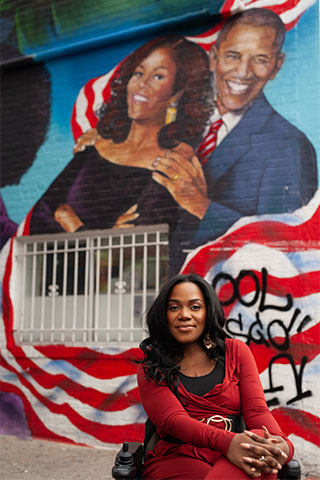
Despite the cancer, Ola was moving forward in her relentless pursuit of working in politics for the betterment of humanity. She had a dream. She wanted to intern at the White House under the Obama administration, and she wasn’t going to take no for an answer. She applied three times and was rejected. “Finally, I got the internship because of my previous work in women’s rights.” During the internship, she worked on President Obama’s Council on Women and Girls. The American Association for People with Disabilities helped Ola secure pay and housing during her internship time. Her work in politics is what finally led her to purchase a wheelchair. “In politics, if someone says I need you to bring this to the post office in five minutes, there’s no catching your breath.” The wheelchair changed Ola’s life. She was finally able to go to the mall with friends, work in fast-paced environments, and move freely and easily across the city. “My wheelchair was liberating. I didn’t have to stand up at marches. At concerts, people scoot you up to the front. I finally had a social life. It was so great!”
I am who I am because of my disability. People read my story and say, ‘You are a role model to me.’ Hearing that from others is what drives me forward.
These days, Ola counts her blessings. Her heart and kidney are functioning well, and she is cancer-free. She believes her disability has altered the course of her life for the better because it led her to her career in social justice. She runs a thriving nonprofit, Project ASCEND, which she single-handedly created in college. “I am the founder and director,” she explains, “We provide college scholarships and grants to disabled youth. In western Nigeria, we funded a library within an orphanage for disabled kids.” She also works full-time for the federal government as a contract specialist, volunteers for countless organizations, and is a highly sought-after public speaker who has shared stages with Senator Cory Booker, House Majority Leader Nancy Pelosi, and former Secretary of State Colin Powell. Her speaking topics range from supporting disability rights to reducing dropout rates in public schools. “My relationship with the word ‘disability’ has improved. At speaking engagements I say, ‘I’m proud to have a disability.’ I used to ask God, ‘Why am I in so much pain?’ I have learned as an adult that I wouldn’t live as purposefully as I do now. I am who I am because of my disability. People read my story and say, ‘You are a role model to me.’ Hearing that from others is what drives me forward.”